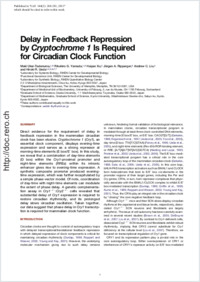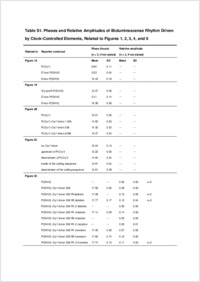Delay in feedback repression by Cryptochrome 1 is required for circadian clock function
- Ukai-Tadenuma, Maki Laboratory for Systems Biology, RIKEN Center for Developmental Biology, Kobe, Hyogo, Japan
- Yamada, Rikuhiro G. Laboratory for Systems Biology, RIKEN Center for Developmental Biology, Kobe, Hyogo, Japan
- Xu, Haiyan Department of Biological Sciences, The University of Memphis, Memphis, TN, USA
- Ripperger, Jürgen A. Department of Medicine/Unit of Biochemistry, University of Fribourg, Switzerland
- Liu, Andrew C. Department of Biological Sciences, The University of Memphis, Memphis, TN, USA
- Ueda, Hiroki R. Laboratory for Systems Biology, RIKEN Center for Developmental Biology, Kobe, Hyogo, Japan - Functional Genomics Unit, RIKEN Center for Developmental Biology, Kobe, Hyogo, Japan - Laboratory for Synthetic Biology, RIKEN Quantitative Biology Center, Kobe, Hyogo, Japan - Graduate School of Science, Osaka University, Osaka, Japan - Department of Mathematics, Graduate School of Science, Kyoto University, Japan
-
13.01.2011
Published in:
- Cell. - 2011, vol. 144, no. 2, p. 268-281
English
Direct evidence for the requirement of delay in feedback repression in the mammalian circadian clock has been elusive. Cryptochrome 1 (Cry1), an essential clock component, displays evening-time expression and serves as a strong repressor at morning-time elements (E box/E′ box). In this study, we reveal that a combination of day-time elements (D box) within the Cry1-proximal promoter and night-time elements (RREs) within its intronic enhancer gives rise to evening-time expression. A synthetic composite promoter produced evening-time expression, which was further recapitulated by a simple phase-vector model. Of note, coordination of day-time with night-time elements can modulate the extent of phase delay. A genetic complementation assay in Cry1−/−:Cry2−/− cells revealed that substantial delay of Cry1 expression is required to restore circadian rhythmicity, and its prolonged delay slows circadian oscillation. Taken together, our data suggest that phase delay in Cry1 transcription is required for mammalian clock function.
- Faculty
- Faculté des sciences et de médecine
- Department
- Département de Biologie
- Language
-
- English
- Classification
- Biological sciences
- License
-
License undefined
- Identifiers
-
- RERO DOC 21821
- DOI 10.1016/j.cell.2010.12.019
- Persistent URL
- https://folia.unifr.ch/unifr/documents/301731
Other files
Statistics
Document views: 120
File downloads:
- pdf: 323
- Supplementary materials: 143

